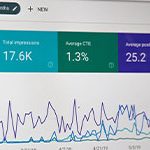Did you know that there are over 250 different factors Google takes into account when it ranks your website? What’s more, not all of those factors are decided by a single department within the company. Instead, they’re thrown out by multiple departments, many of which don’t communicate directly. The result is that nobody at Google can tell you where your website will rank. It’s all done by robots.
That’s not to say that there’s nothing you can do to affect your ranking of course. Being unsure of your exact position doesn’t mean you can’t plot a path to a better place. But it does emphasize the fact that SEO tactics are many and always changing. So what can you do to up your game and improve your ranking on Google? Let’s find out.

Snoop On The Competition
If you’re new to a particular industry, there’s a good chance that a lot of SEO work has already been done for you by your competitors. That’s why it’s always a good idea to snoop on them and find out what they’re doing. The good news is that there are plenty of tools out there that can help. Semrush might have a terrible name. But it’s a tool that allows you to track your competitor’s keywords and the hits they get from each of them. All you have to do is type in their main URL into the Semrush website. Then the on-site app will trawl its databanks to find out as much as it can about the traffic going to that site. One of the cool things Semrush does is provide a graph of the traffic that the site has received over time. Make sure you pay careful attention to this chart, as you can pinpoint times when traffic spiked. Do some research and find out what caused traffic to spike? Was it a particular marketing campaign? Was the company in the news? Did they suddenly release a great marketing video?
Semrush also provides information on where a company got its visitors. It breaks down visitors into paid search and organic. Paid search visitors are those who have reached the website through various internet ads. Organic search is those that arrived by typing in a keyword and clicking on the relevant result. If your competitors are keen on paid search, have a look at their adverts and see where they are having success. If organic search dominates your industry, bids on adverts are likely to be low. And that means that your paid search efforts may pay off more.
Devise Your Content Creation Strategy
When businesses first start blogging, they tend to be quite naive. They don’t understand that blogging for SEO is different from, say, writing an article for a newspaper. Yes, blogs have to be engaging. But they also have to appeal to Google’s army of robots who trawl your site. The first thing to do is to settle on a group of key topics and keywords you’ll target. If you’re a tech company, you’ll want your keywords to revolve around techie things, like “data” and “apps.” The next thing to do is to identify key topics you’ll focus on. Will you concentrate on consumer products? Or is your business limited to the B2B market? The answer to these questions will determine the topics you focus on. Focusing on particular areas will increase your rank when certain groups search for you using keywords. So make sure your posts are relevant to the products and services you offer.

Third
Make your posts relatively long. Google likes websites with lots of content and information. And it’s much more likely to think your page offers something customers want if it contains a longer blog. For instance, there are dozens of blogs on the features of the new iPhone. But few of them will go into any sort of significant detail about the phone’s actual features. The posts that do, however, are more likely to be the ones that are highly ranked.
Fourth
You need to make sure that you churn out content on a regular basis. Google wants to know if your site is “loved” and that you’re providing new material to customers. Google boosts sites that are regularly updated because they’re providing users new content. It’s a good idea, therefore, to build content generation into your schedule. Set aside a couple of hours a week to generate new content. And use automated software to post blogs on your behalf.
Fifth
Include images in your blog and make sure they are tagged with your keywords. Images help boost your blog’s SEO for a couple of reasons. The first is that images maintain reader interest. When readers are interested, they’re more likely to stay on your page. And the longer they stay on your page, the higher you’ll get ranked on Google. The other reason is that images are an extra way to insert your keywords. Label your images according to the keywords you’re targeting. Google will see your post as being more relevant to certain, related searches.
Sixth
Don’t just spam your keywords. When Google decides the relevance of a post, it looks mainly at the title and then the first few words in the text body. It’s a good idea to include your keywords in the title and the first couple of sentences. But after that, just write in a way that sounds natural and that your subscribers will enjoy. Additional keywords are not weighted as heavily in the search results.
Learn How To Do “Off-Page SEO”
On-page SEO is all the stuff you can do to boost your ranking within the blog itself. Off-page SEO is all the other stuff that you can do to improve your ranking that doesn’t involve the blog itself. Off-page SEO is relatively technical, and most people will need some kind of professional guidance. Technical guidance is available, and you can find it from Simplilearn.

The important points to remember are first: post your blogs on social media accounts. Social media sites have a degree of gravitas that Google likes. Links to your site from your social media accounts often count for a lot, especially when starting out. And two: find ways to generate inbound links from reputable sites. The more inbound links you have, the greater quality Google will ascribe to your content.
Begin An Off-Page SEO Strategy

You might be generating great content within your blog. But if your business isn’t making waves on the rest of the internet, you might as well forget it. Reaching out to third party websites is important. If a third party website is rated highly by Google and it links to your business, then it passes some of its credibility to you. The better the ranking of the site, the more credibility you gain. Companies can start by reaching out to forums, directories and even video marketing sites, like Vimeo. Once these links are established, Google will take notice and start to believe that your business is legitimate.
Go Local, Then Move Beyond
When you’re just starting out, it’s unlikely that you’ll be able to compete on the national and international stage. There are just so many websites out there, ranking high is next to impossible. But that doesn’t mean that it’s utterly impossible ever to go in that direction. It just means scaling back your SEO operations slightly first. If you’re a new business, the best place to start targeting your SEO is in your local area. Don’t bother including the town in which your business is based in all your content. Instead, use things like Google My Business and get specific about where you’re located. You can create things like geo-targeted landing pages. And you can devise adverts that target only people living in a given region.
Use The Correct SEO Tools
There are a bunch of SEO tools out there that help people find the right keywords for their particular industry. Adwords, of course, contains its own Keyword Planner. But there are loads of third party apps that do an equally good, if not better job. SpyFu, Keywordspy and others help firms gain insight into what the competition is up to. These tools don’t just focus on keywords either. They examine what types of landing pages your rivals are using and what images work the best for them.
There are also tools that will audit your site to see if it is optimised correctly for your content. MySiteAuditor and other tools provide feedback on how you can improve your website visibility to search engines.
Commit The Time And The Budget
These days, SEO is not a business option, it’s a business imperative. In the future, we’ll probably see whole departments dedicated to the activity, just to get a leg up on the competition. Your company needs to commit both the time and the money to SEO projects today. That may mean thinking carefully about SEO hiring opportunities. Or it could mean setting aside a morning each week to do both on-page and off-page activities.











